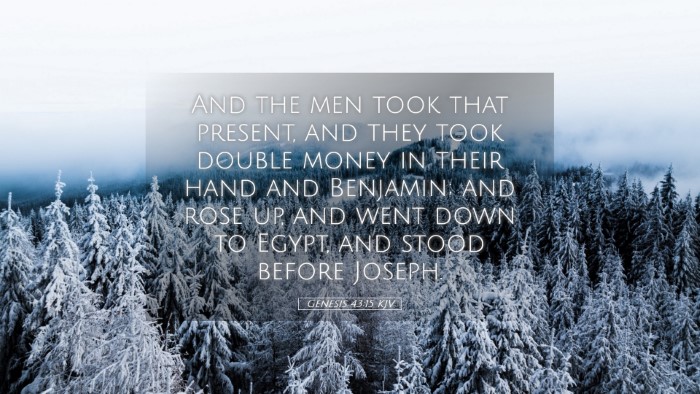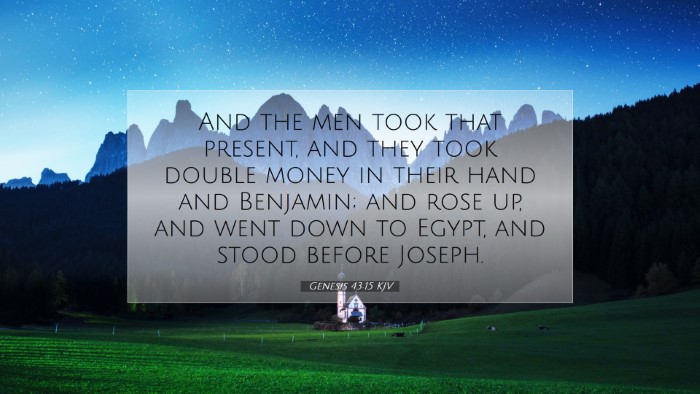Commentary on Genesis 43:15
This verse reads: "So the men took that present, and they took double money in their hand, and Benjamin; and rose up, and went down to Egypt, and stood before Joseph." In this passage, we witness a significant moment in the narrative of Joseph and his brothers. The actions taken by the brothers come with deep theological and practical implications.
Contextual Background
In the preceding chapters, we see the buildup to this event. Joseph, who has risen to power in Egypt, has recognized his brothers during their visits to procure grain during a famine. The emotional turmoil and reconciliation themes are crucial as we analyze Genesis 43:15.
The Presentation of Gifts
Matthew Henry comments on the nature of the gifts presented by the brothers. He notes that they brought their best to appease Joseph, who was still a stranger to them. This act of bringing presents symbolizes their acknowledgment of Joseph’s position and power, reflecting a mixture of fear and respect.
Moreover, Albert Barnes emphasizes the importance of these gifts, explaining that such a practice was common in ancient Near Eastern cultures. It reveals the brothers' recognition of their need to approach a powerful figure with humility and offerings, suggesting an understanding of proper etiquette in their society.
Double Money: A Symbol of Restoration and Grace
The mention of "double money" is particularly significant. Adam Clarke expounds on this detail, interpreting it as an act of restitution and perhaps a foreshadowing of the grace that Joseph would eventually bestow upon his brothers. This payment signifies not only their return to Egypt but also their willingness to face the consequences of their past actions towards Joseph.
Matthew Henry further explains that the double money could also represent God’s providence and care for His people, where He not only addresses their immediate needs during the famine but prepares the way for their eventual reconciliation. The act of carrying extra money reflects their desperation and hope for acceptance.
Benjamin's Role: The Beloved Son
Bringing Benjamin into the narrative is of immense importance. As the youngest and beloved son of Jacob, his inclusion signifies several themes:
- Fear of Rejection: The brothers bring Benjamin with them, motivated by their fear of Joseph’s previous insistence that he must be present to validate their claims (Genesis 42:15).
- Familial Bond: His presence underscores the theme of family loyalty and the lengths to which the brothers will go to secure Benjamin's safety.
- Symbol of Innocence: Benjamin represents innocence in this narrative. His inclusion reflects the brothers' desire for redemption and their hope that Jacob’s favored son would appeal to Joseph’s mercy.
Divine Providence and Human Agency
This passage illustrates the interplay between divine providence and human agency. Albert Barnes discusses the significance of the brothers’ actions as a cooperative effort to restore their family and repair the wrongs committed against Joseph. It highlights a crucial understanding that God orchestrates events through human decisions, showcasing His sovereignty even amidst human sin.
Matthew Henry further accentuates this theme by noting how every step taken by the brothers—despite their guilt and fear—serves to fulfill God’s plan not only for Joseph but also for the entire house of Israel. This duality of action and divine insight is a reflection of the theological narrative throughout scripture.
The Journey to Egypt: A Metaphor for Transformation
The journey taken by the brothers can also be seen as a metaphor for spiritual transformation and repentance:
- Facing the Past: They are compelled to confront their previous sins against Joseph. Their journey symbolizes a necessary retreat into their past to seek forgiveness.
- Hope for Restoration: Each step toward Egypt is fraught with tension but also filled with the hope of familial restoration and reconciliation.
The Implications for Theological Reflection
This narrative exhorts pastors and theologians to ponder the themes of grace, repentance, and the complexity of human relationships in light of God’s overarching plan. The act of presenting gifts and taking Benjamin signifies an attempt to mend relationships through actions of humility and acknowledgement of past errors.
Practical Applications for Today’s Believers
As we unpack Genesis 43:15, it serves as a call for believers to consider the following:
- Restoration in Relationships: Just as Joseph’s brothers sought to restore their broken relationships, believers are encouraged to pursue reconciliation in their own lives.
- The Importance of Humility: Approaching others with gifts can symbolize humility and a recognition of the other’s significance.
- Faith and Trust in God's Providence: Despite uncertainty, Christians are reminded to trust in God's divine plans, knowing that He orchestrates events for our good.
Conclusion
In conclusion, Genesis 43:15 is much more than a simple verse narrating a trip to Egypt. It is a profound reflection on human relationships, the impact of past sins, and the redemptive grace of God. The combination of bringing gifts, the symbolism of double the money, and Benjamin's role invites deep exploration into the nature of repentance, humility, and divine providence.


